Introduction
Is Celery Good For Rabbits: When it comes to the dietary choices for our furry companions, such as rabbits, it’s essential to be well-informed and considerate. The question of whether celery is good for rabbits delves into the realm of rabbit nutrition, the benefits and potential drawbacks of including celery in their diet, and the considerations for providing a balanced and wholesome meal plan. Join us as we unravel the verdant world of celery and its role in the dietary lives of these charming herbivores.
Celery is rich in dietary fiber, which is beneficial for digestive health in rabbits. Fiber helps maintain a healthy gut environment and prevents issues like gastrointestinal stasis.Celery has a high water content, which can contribute to hydration, especially during warmer months. Adequate hydration is vital for a rabbit’s overall well-being.Celery is low in calories, making it a suitable option for rabbits that need to maintain a healthy weight.
While celery offers some vitamins and minerals like vitamin K, potassium, and folate, it’s important to note that rabbits have specific dietary requirements. They need a balanced diet that includes a variety of vegetables to meet their nutritional needs.Celery contains oxalates, which are compounds that can interfere with calcium absorption. Too many oxalates in the diet can potentially contribute to the formation of bladder or kidney stones. Therefore, moderation is key.Celery should be viewed as an occasional treat rather than a staple food. Rabbits require a diverse diet that includes various vegetables, high-fiber hay, and limited amounts of pellets.
If you decide to introduce celery to your rabbit’s eat, do so gradually and in small quantities. This allows their digestive system to adjust and prevents digestive upset.Wash celery thoroughly before offering it to your rabbit to remove any potential pesticides or contaminants.
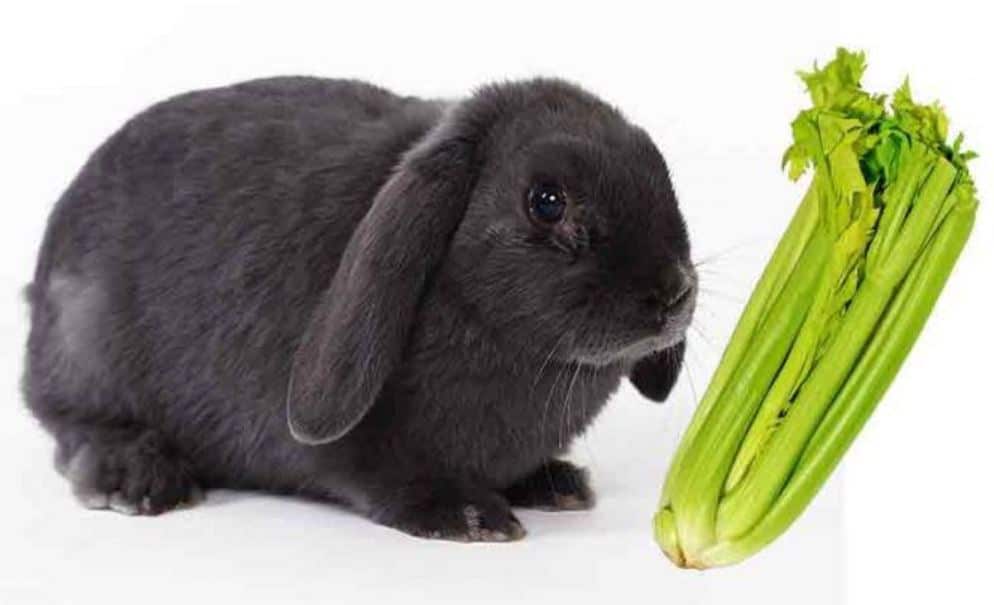
How much celery can a rabbit eat?
You can include celery leaves in your rabbit’s diet as well as celery sticks. However, you should only feed ½ of a celery stick to your rabbit per day. Too much celery means your rabbit is eating less hay, which is important for their digestive system.
Moderation is Key
While celery can offer certain benefits to rabbits, it’s important to remember that it should be considered a treat rather than a main staple of their diet. Rabbits have specific dietary needs that include a variety of vegetables, high-fiber hay, and a limited amount of pellets. Celery can be a part of this variety but should not dominate their intake.
Recommended Serving Size
A general guideline for celery consumption is about 1 to 2 tablespoons of chopped celery per day for an average-sized rabbit. This amount ensures that your rabbit benefits from the fiber and hydration without overloading them with excess oxalates.
Oxalate Consideration
Celery contains oxalates, compounds that can interfere with calcium absorption and potentially contribute to bladder or kidney issues. Offering small amounts of celery helps mitigate the risk of overexposure to oxalates.
Monitor Digestive Response
As with any new food introduction, closely observe your rabbit’s digestive response to celery. Some rabbits may tolerate celery well, while others may experience digestive upset. If you notice any changes in stool consistency or behavior, it’s wise to adjust the portion size or discontinue celery altogether.
Variety is Essential
Remember that a rabbit’s diet should consist of a variety of vegetables to provide a well-rounded array of nutrients. Rotate different vegetables to ensure your rabbit receives a diverse range of vitamins and minerals.
What vegetables can rabbits eat daily?
“Carrots should be fed sparingly, as they are very high in carbohydrate and may upset GI bacterial flora.” Particularly good vegetables include the dark leafy greens like romaine lettuce, bok choy, mustard greens, carrot tops, cilantro, watercress, basil, kohlrabi, beet greens, broccoli greens, and cilantro.
Bell Peppers
Bell peppers, particularly the green variety, are a great source of vitamin C and can be included daily in small amounts.
Carrots
Carrots are well-known rabbit treats, but they should be given in moderation due to their sugar content. Small daily portions are acceptable.
Cucumber
Cucumber, with its high water content, can be a refreshing daily addition to your rabbit’s diet, especially during warmer months.
Zucchini
Zucchini is a low-calorie, nutrient-rich vegetable that rabbits can enjoy daily in small quantities.
Broccoli Leaves
While offering the florets in moderation, the leaves of broccoli can be fed daily as they are low in oxalates.
Spinach
Spinach is a nutritious option, but due to its oxalate content, it’s best to feed it in moderation and rotate it with other greens.
Kale
Kale is a nutrient powerhouse, but its calcium content should be considered. It can be fed a few times a week rather than daily.
Can rabbits eat cauliflower?
Cauliflower
Cauliflower is a veggie, so it’d be a perfect, healthy snack for your rabbit, right? Surprisingly, no. Although vegetables are an ideal addition to the high-fiber hay that bunny diets require, cauliflower causes rabbits to bloat and become gassy.
Nutritional Highlights
Cauliflower is a source of dietary fiber, which aids in maintaining a healthy digestive system for rabbits.It contains vitamins like vitamin C, which supports the immune system, and vitamin K, important for blood clotting.
Cauliflower is low in calories, making it a suitable option for rabbits that need to manage their weight.
Caution
Cauliflower, like other cruciferous vegetables, can potentially lead to gas formation in rabbits. Some rabbits may tolerate cauliflower well, while others may experience digestive discomfort.As with any new food, moderation is key. Introduce cauliflower gradually and in small quantities to observe your rabbit’s reaction.
Cauliflower contains oxalates, compounds that can interfere with calcium absorption and potentially contribute to bladder or kidney issues. This is another reason to offer cauliflower in moderation.
Preparation
Wash cauliflower thoroughly to remove any potential pesticides or contaminants.Remove the tougher stems and leaves, as these parts can be more difficult for rabbits to digest.
Consult a Veterinarian
Before incorporating any new food into your rabbit’s diet, it’s recommended to consult a veterinarian experienced in rabbit care. They can provide personalized guidance based on your rabbit’s individual health and dietary requirements.
Can rabbits eat raw celery?
Yes, rabbits can eat celery! It can be included as part of their balanced diet. Remember, giving your rabbit a variety of different vegetables will make it as healthy as possible.
Variety and Moderation
As with any food, variety is essential in a rabbit’s diet. While raw celery can be included occasionally, it should not be the sole vegetable offered. Rotate different vegetables to provide a diverse array of nutrients.
Monitor Digestive Response
Closely observe your rabbit’s digestive response when introducing raw celery or any new food. Some rabbits may tolerate it well, while others may experience digestive upset. Adjust the portion size or discontinue celery if you notice any negative effects.
Consult a Veterinarian
Before making significant changes to your rabbit’s diet, especially if you’re introducing new foods, consult a veterinarian experienced in rabbit care. They can provide personalized guidance based on your rabbit’s specific dietary needs and health status.
Can rabbits eat tomato?
“A small acorn-size amount of seedless tomato per day is perfectly fine for a rabbit older than 12 weeks of age,” Henson said. So in general, tomatoes are an OK fruit to share with your rabbit, just as long as it’s a small amount and the flesh part of a seedless tomato only.
The world of rabbit nutrition is a complex puzzle, where each piece must be carefully considered to ensure the health and well-being of our furry companions. The question of whether rabbits can eat tomatoes delves into the colorful world of this beloved fruit, exploring the benefits, potential hazards, and considerations when it comes to including tomatoes in a rabbit’s diet. Join us as we unravel the tale of tomatoes and their place in the dietary lives of rabbits.
Nutritional Insights
Tomatoes, with their vibrant hues and juicy flesh, contain certain nutritional elements that could potentially be beneficial for rabbits:
Vitamins: Tomatoes are rich in vitamins like vitamin C, which supports the immune system, and vitamin A, important for vision and skin health.
Water Content: Tomatoes have a high water content, which can contribute to hydration, especially during warmer months.
Antioxidants: Tomatoes contain antioxidants like lycopene, which have potential health benefits.
The Caution Zone
While tomatoes offer some nutritional positives, there are several important considerations to keep in mind when it comes to rabbits:
Nightshades: Tomatoes belong to the nightshade family, and some parts of the plant contain compounds that can be harmful if consumed in excess.
Solanine Content: The leaves, stems, and green parts of tomatoes contain solanine, a toxic substance that can cause digestive upset and other health issues in rabbits.
Acidic Nature: Tomatoes are relatively acidic, which can lead to digestive discomfort in some rabbits, particularly those with sensitive stomachs.
What should rabbits eat most?
Hay is the most important part of a rabbit’s daily intake. Unlimited, high-quality grass hay, such as Timothy, orchard or brome, should make up the bulk of a rabbit’s diet. Grass hay is high in fiber, which is critical to maintaining a rabbit’s healthy digestive tract.
Hay: The Staple Diet Component
Hay is the cornerstone of a rabbit’s diet and should make up the majority of their daily intake. It provides essential fiber, which is crucial for maintaining healthy digestion and preventing issues like gastrointestinal stasis. The two main types of hay recommended for rabbits are timothy hay and grass hay. Fresh, high-quality hay should be available to rabbits at all times, as it not only aids digestion but also keeps their teeth naturally worn down.
Fresh Vegetables: A Colorful Array
Fresh vegetables are another essential part of a rabbit’s diet, offering a diverse range of vitamins and minerals. Leafy greens like romaine lettuce, kale, and spinach can be included daily, providing nutrients and hydration. Other vegetables like carrots, bell peppers, cucumbers, and zucchini can be given in moderation as well-rounded supplements to their diet.
Limited Pellets: Precise Portions
Pellets are a concentrated source of nutrition and should be fed in moderation. High-fiber pellets that are specifically formulated for rabbits can be a valuable addition to their diet, but the daily portion should be carefully controlled to avoid overfeeding. A general guideline is about 1/4 to 1/2 cup of pellets per day for an average-sized rabbit.
Fresh Water: Hydration is Key
Fresh and clean water should be available to rabbits at all times. Hydration is essential for maintaining their overall health and well-being.
Treats: Occasional Indulgences
Treats should be given sparingly and in small quantities. Fruits like apples, berries, and melons can be offered occasionally, along with small amounts of safe herbs. Always remember that treats should not replace hay, vegetables, or pellets in a rabbit’s diet.
Is cabbage OK for rabbits?
Rabbits can eat cabbage, but it must be given to them in moderation, and avoided if you give your rabbit lots of other brassicas. A good handful of greenery each day is a crucial part of a rabbit’s diet, and cabbage is a great addition to this.
When it comes to providing a balanced and nutritious diet for rabbits, every food choice requires careful consideration. The question of whether cabbage is okay for rabbits delves into the realm of rabbit nutrition, exploring the benefits, potential drawbacks, and guidelines for including cabbage in their diet. Join us as we unravel the story of cabbage and its place in the dietary lives of our furry companions.
Monitor and Observe
Observe your rabbit’s response to cabbage closely. Some rabbits may tolerate it better than others. If you notice any signs of discomfort, digestive upset, or changes in behavior or stool quality, discontinue offering cabbage.
Consult a Veterinarian
Before introducing any new food into your rabbit’s diet, especially those with potential risks, consult a veterinarian experienced in rabbit care. They can provide personalized guidance based on your rabbit’s health status and dietary requirements.
Can rabbits eat boiled eggs?
Though this likely will not come as a surprise, it is worth mentioning that rabbits, as herbivores, should never be offered meat, eggs, or dairy.
Protein Power
Boiled eggs are known for their protein-rich content, which can be beneficial for certain animals. However, for rabbits, who are strict herbivores, the introduction of animal-based proteins requires careful examination.
Protein Alternatives
Rabbits can meet their protein requirements through their natural diet without the need for animal-based proteins. High-fiber hay, fresh vegetables, and limited pellets provide the necessary nutrients for their well-being.
The Importance of Hay
Hay remains a fundamental component of a rabbit’s diet, providing essential fiber for healthy digestion and maintaining proper dental health.
Consult a Veterinarian
Before introducing any new food into your rabbit’s diet, especially those that deviate from their natural herbivorous preferences, consult a veterinarian experienced in rabbit care. They can provide personalized guidance based on your rabbit’s individual needs.
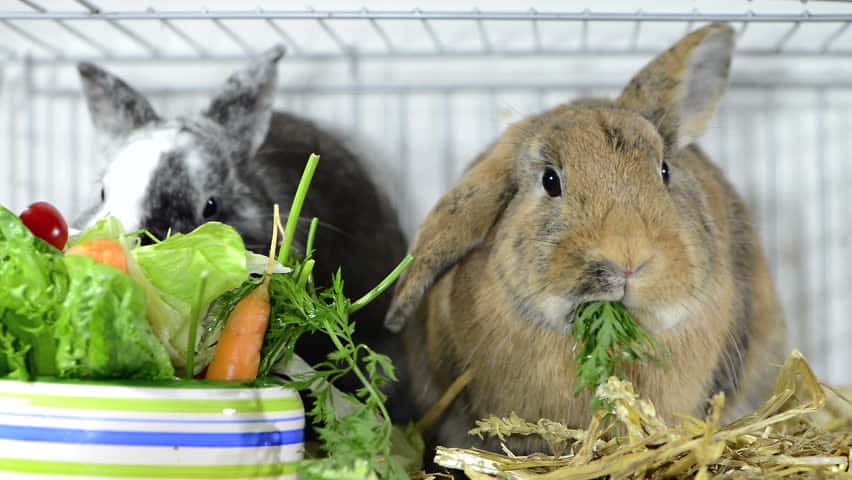
Conclusion
As we conclude our exploration of whether celery is good for rabbits, it’s clear that this crunchy vegetable has its merits and considerations when it comes to rabbit nutrition. While celery offers fiber, hydration, and a low-calorie option, its oxalate content prompts the need for a cautious approach.Celery can indeed be included in a rabbit’s diet, but moderation is key. Offering small amounts as an occasional treat ensures that your furry friend benefits from its fiber and water content without overloading their system with oxalates.
Remember that rabbits are herbivores with specific nutritional requirements. Celery should be part of a varied diet that includes a mix of vegetables, high-fiber hay, and limited pellets to provide the necessary nutrients for optimal health.As with any dietary changes, consulting a veterinarian experienced in rabbit care is crucial. They can offer tailored advice based on your rabbit’s individual needs and health status.Celery’s high water content makes it a potential ally in keeping your rabbit hydrated, especially during warmer seasons. Just ensure it’s part of a comprehensive hydration strategy.
In the world of rabbit care, understanding the nuances of dietary choices is vital for maintaining your furry companion’s health and well-being. So, while celery can make an occasional appearance in your rabbit’s food bowl, always strike a balance between providing variety and meeting their specific nutritional needs. By approaching celery with care and consideration, you’re contributing to the vibrancy and vitality of your beloved rabbit’s life.

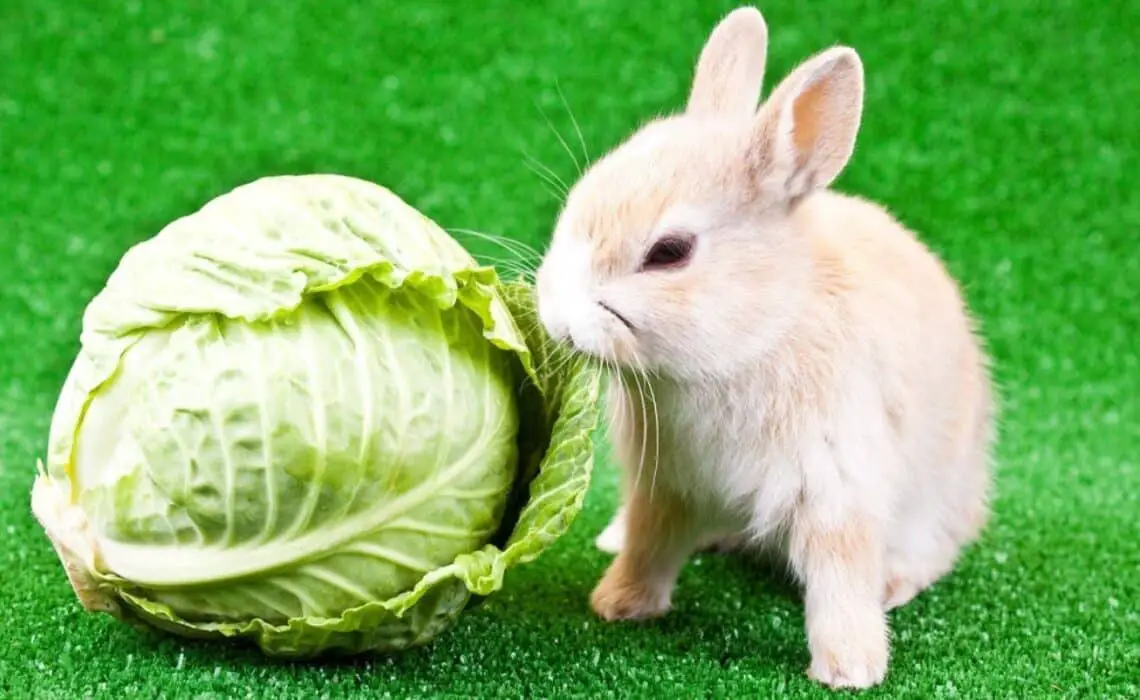
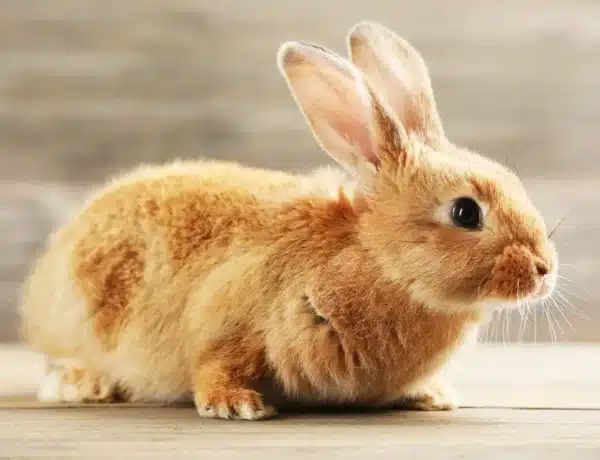

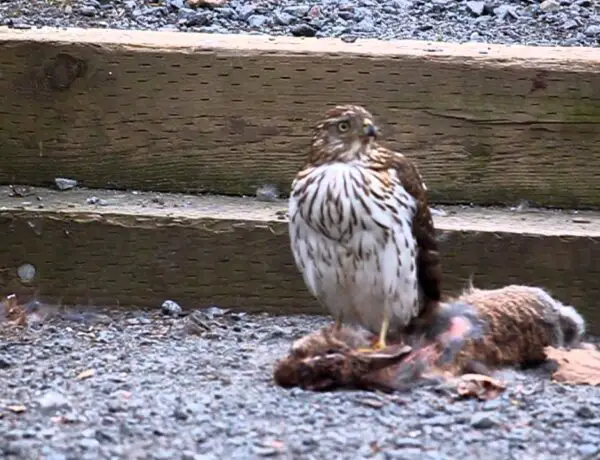
No Comments